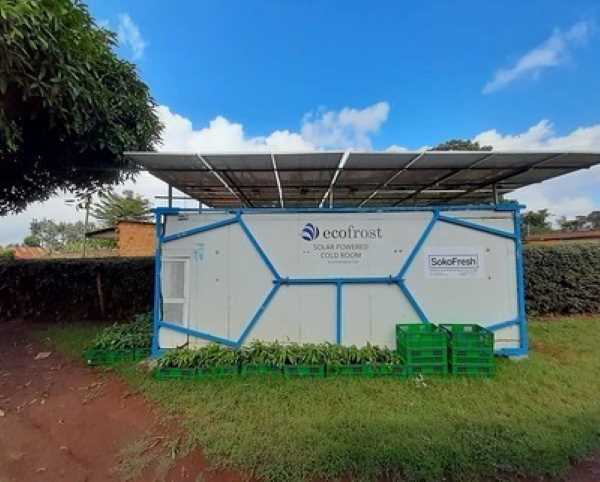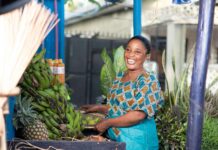
The lack of reliably available refrigeration throughout Africa threatens the livelihoods of the continent’s agricultural workers while contributing to food insecurity and waste. Innovative entrepreneurs have tackled the problem with purposeful solutions that give long-term benefits. Explore the emerging trends that could cause the most transformative impacts.
Pay-As-You-Go Refrigeration
The pay-as-you-go model has become popular for making essential services or infrastructure accessible for customers on modest budgets. Some business owners hope it could open chilled storage possibilities for African agricultural professionals who must keep fresh produce at the correct temperature to prevent spoilage.
ColdHubs is a Nigerian company founded by Nnaemeka Ikegwuonu. It caters to smallholder farmers, market merchants and others requiring refrigerated solutions. It provides as-needed access to solar-powered cold rooms. Between September 2017 and July 2022, the brand more than doubled the number of these facilities, suggesting rising demand.
Each hub operates 24/7 and holds 3 tonnes of food. Parties rent 20-kilogram crates based on their expected usage. Ikegwuonu has diversified the initial vision by acquiring refrigeration trucks to accompany the stationary sites. The enterprise also developed phase-change cooling technology to assist meat and fish value chains. The approach relies on special materials that keep sensitive goods at the right temperatures after nightfall, even though renewable energy chills them first.
This strategic treatment of perishable items has far-reaching benefits. It supports profitability and reduces unsellable products. Individuals only pay for the space they need, enjoying budget-friendly convenience. Rentable, climate-controlled spaces facilitate the growing zero-waste agriculture trend. Farming workers participating in the method can promote soil health and improve yields, boosting earning potential. Preventing wasted harvests enables higher profits, too.
Cold Storage at the Source
Africans who farm and fish for a living can get better results via near-immediate access to refrigeration facilities. These facilities tackle challenges caused by spoilage in transit. Keep IT Cool addresses this problem by working alongside professionals in the farming and fishing industries to establish temperature-controlled storage units at the unloading points for perishable goods. The Nairobi-based startup made pricing guarantees with 1,600 retailers, enabling income security by eliminating condition-based fluctuations.
The company reduced waste by over 25% and helped incomes rise by more than 15% for 3,600 participants. Keep IT Cool also measures success in data-driven ways, including tracking post-harvest losses and resource-related excesses. Since 2022, the brand has lowered the first metric by 98% when handling 1.5 million kilograms of food. Because the business accepts 250,000 kilograms of product weekly, it achieves significant impacts.
Its leaders have bigger plans, such as constructing Kenya’s solar-powered cold chain distribution facility for small-scale farmers. Due to its 70-tonne capacity, the location boasts seven times the space of its present site. The executives hope to expand in East Africa and beyond while growing the company’s fruit, vegetable and poultry operations.
Many people cite the potential utility savings and increased property values when discussing solar power’s benefits. Those advantages make this renewable energy option ideal for businesspeople eyeing long-term investments. Numerous other projects throughout Africa also rely on power from the sun, such as health clinics that use it to refrigerate vaccines or infrastructure initiatives that install water pumps in drought-prone areas to increase climate resilience. Keep IT Cool’s expansion aligns with overall progress.
Mobile Cold-Chain Delivery and Storage Solutions
Supporting African agriculture means seeking meaningful partnerships built on future-proof, forward-thinking strategies. Keep IT Cool’s collaboration with Roam Electric exemplifies those goals. Roam Electric is a mobility company that specializes in sustainable buses and scooters. Its scooters became a central part of new cold-chain infrastructure with Keep IT Cool’s solar-powered refrigeration options.
A representative said these plans tackle a crisis since improper refrigeration and handling cause the loss of over 50% of East African poultry and fish. The electric motorcycles close the last-mile delivery gap, taking perishable goods from the source to sale points. They carry up to 240 kilograms and cost up to 75% less to run than internal combustion engine versions. Units on the back of each one offer convenient cold-storage possibilities and get the contents to markets faster, promoting freshness.
As another example of innovative storage solution trends, SokoFresh is a Nairobi startup that brings solar-powered, off-grid mobile storage facilities to smallholder farmers. These units include renewable energy sensors, evaporators and condensers to keep them operating in a consistent temperature range. Customers can rent them for short or long periods — depending on their needs — even if they farm in remote areas. A mobile app helps farmers monitor real-time conditions, even when they are temporarily away from their farms.
Thermal Ice-Battery Systems
The increasing popularity of solar-powered technologies in Africa and other parts of the world stimulates advancements by encouraging entrepreneurs to develop new ways to achieve goals. Koolboks is a Parisian company that moved beyond its European headquarters to establish operations throughout Africa.
Its solar-powered refrigerators feature thermal-battery technology that allows the units to function for up to four days without external power. The brand’s representatives recognize the products’ revolutionary potential, positioning them as freezers that could save lives and businesses while helping households pay for school fees or additional essentials.
Internet of Things sensors allow remote monitoring, increasing farmers’ confidence when they cannot feasibly check chilled goods in person. Prompt alerts of possible problems let employees react in time to prevent spoilage.
The business prioritizes financial flexibility for interested parties by providing pay-as-you-go and buy-now-pay-later arrangements. This allows people living and farming in areas without reliable electricity to save perishable produce when grid outages occur. This offering also promotes sustainability by allowing customers to reduce dependence on diesel generators. Its ability to keep contents cold for days also gives users more time to deal with power disruptions.
An Exciting Future for African Agriculture
These refrigeration and freezer solutions directly support the lives and work of African farmers, helping them reduce waste caused by improper or unavailable storage. Because most rely on solar power, such innovations also facilitate the continent’s future resilience, making agricultural professionals more adaptable to situations outside of their control, such as grid outages. Despite the inevitability of those events, purposeful technologies allow flexibility and improved awareness.

Jane is an agriculture and environmental journalist and the founder and editor-in-chief of Environment.co, where she covers sustainability and eco-friendly living.







